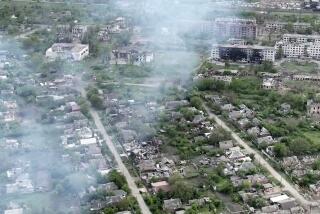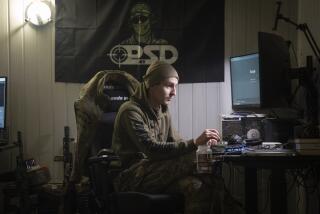Aerial Death Threat Sends Chechens Fleeing From Village : Caucasus: Russians warn they will bomb five towns near Grozny unless 50 captured paratroopers are quickly freed.
- Share via
ALKHAZUROVO, Russia — This is a village under Russian death threat.
Within hours after Chechen villagers captured 50 heavily armed Russian paratroopers who dropped into the thick forests near this hamlet of shepherds and farmers at the base of the Caucasus Mountains, Russian helicopters flew over and delivered the ultimatum.
“Attention! Attention!” a crewman said over a loudspeaker, repeating the broadcast in Russian and Chechen. If you do not surrender the Russian prisoners and their weapons, the announcement said, your village and four others nearby will be bombed in 48 hours.
Within hours, thousands of refugees who had fled to sleepy Alkhazurovo from the punishing bombing of the rebel capital, Grozny, were on the road again.
On Monday, 24 hours after the Russian threat, all but three of the captured paratroopers had been moved out of Alkhazurovo, a village of 5,000 people 20 miles south of Grozny. Some were seen under guard in Grozny; others were being held elsewhere in the breakaway republic of Chechnya, rebel commanders said.
The Russian ultimatum was to expire at midnight Monday. By that time, Moscow had announced a unilateral 48-hour cease-fire, but it was unclear whether Russian troops would comply. In any case, the people of Alkhazurovo had no doubt the Russians in the helicopters can carry out their threat.
“Women are afraid, old people are afraid, everybody is afraid,” said Leila Tapayeva, 56, one of many civilians who refused to leave the village despite an effort to evacuate women and children before the deadline.
“This isn’t terrorism; this is barbarism,” said Khasan V. Turkayev, a professor of Chechen literature who lives nearby.
Chechen commanders said they had no intention of handing over the Russian POWs but allowed journalists to speak to the prisoners Monday.
The story of how the vaunted and elite paratroopers were captured by a group of Chechen villagers, half of whom were armed only with hunting rifles, shed light on why all Moscow’s might has so far failed to crush the proud, fierce and long-persecuted Chechen people.
Maj. Igor M. Morozov, commander of the Russian paratroopers captured in Alkhazurovo, had a simple explanation.
“When I saw the (Chechen) fighters myself, I realized that this war is being waged not against ‘criminal gangs’ but against ordinary people,” said the commander, who fought in the Soviet war in Afghanistan from 1986 to 1988. “This is a second Afghanistan here.”
Morozov, who was permitted to give interviews only in the presence of a Chechen KGB captain, said his paratroop unit from Rostov was dropped by helicopter into the forest on New Year’s Eve.
Its mission was to find a cache of ammunition believed hidden by Chechen rebels in the hills near Alkhazurovo and radio the location, Morozov said. The unit was also ordered to prepare a pad for more paratroopers to land and was given three days to accomplish this.
But things went wrong from the start. As the paratroopers floated down, they were spotted by local Chechens, so Morozov decided to retreat into the mountains and hide there until helicopters could come pick them up.
“I reported this to my commanders but they insisted we carry on,” Morozov said. A helicopter dropped dried rations for three more days. The paratroopers never found an arms cache, and the territory proved much more rugged than they had bargained for. Friday, a heavy low fog prevented helicopters from flying in to pick them up as scheduled, he said.
On Saturday, the foggy mountain where the paratroopers were hiding was surrounded by Chechen fighters. In the ensuing firefight, two Russians were killed and two injured, Morozov said.
“When it became clear that we were encircled, resistance was pointless. It wasn’t flying weather, and we could expect no help. We decided to lay down arms and surrender so as not to spill more blood,” the 30-year-old major said.
“When I saw the fighters for the first time, half of them were armed only with hunting rifles, and there were 15- and 16-year-old boys among them,” he said. “I immediately remembered Afghanistan and the people we had to fight there.”
Since Morozov’s capture, he has met Chechen veterans of the Soviet army who also fought in Afghanistan. “We understand each other very well,” he said.
Morozov said he expects to face demotion, discharge or worse when he eventually returns to Russia. But he said he is comforted by the fact that most of the young soldiers he commanded will return home alive.
Like three of his men who were being held separately in a private Chechen home, Morozov said he is being treated very well. He warned that if the Russians attack Alkhazurovo, the prisoners may be affected.
“The people’s patience is not inexhaustible,” he said.
Chechen KGB Capt. Abu M. Movsayev said the Russian prisoners would never be mistreated. He suggested the soldiers might be handed over to their parents “so that more blood will not be spilled.”
Villagers in Alkhazurovo gave a slightly different version of the paratroopers’ capture. They said two young hunters had stumbled upon the Russians, who took them hostage. Villagers said when they went looking for the hunters, they found hungry, cold and demoralized paratroopers who gave up almost without a fight.
Whatever the truth, the incident bodes ill for the Russian military, which will almost surely be forced to fight guerrillas in the mountains and villages of Chechnya if and when Grozny falls.
The bombing of civilians in cities and villages across Chechnya seems only to have enraged, embittered and unified the people, who believe the Russians will exterminate them if they stop fighting now.
“Even if we gave them their prisoners back, they would still keep bombing us,” said Vakhid Nesiyev, 35, a builder. “History shows they don’t keep their promises.”
More to Read
Sign up for Essential California
The most important California stories and recommendations in your inbox every morning.
You may occasionally receive promotional content from the Los Angeles Times.













